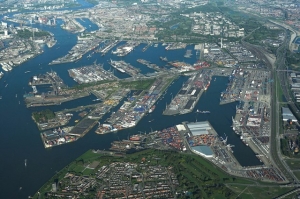


(Posted on 27/11/18)
REKO, short for Recycling Kombinatie REKO B.V., has started construction on a new thermal treatment plant that will process an annual total of 1.2 million tonnes of residual mineral waste – a mix of tar asphalt granulates and roofpaper – into clean sand, gravel, electricity and heat. The project, which will be realised in Rotterdam’s port area, involves a total investment of € 125 million.
REKO produces sand, gravel and fillers from mineral residues. Most of the waste materials processed by REKO come from road re-construction (asphalt fragments) and building projects (roof paper). In the first decade of the 21st century, REKO, working in partnership with renown suppliers of process engineering equipment, developed an innovative process that specifically focuses on the thermal treatment of this mineral waste. This in-house development ultimately resulted in the construction of the first thermal treatment plant, which REKO took into operation in 2006. Since then, this system has effortlessly processed some 600,000 tonnes of mineral residues per year. Over the past 12 years, the facility has already produced some 7.2 million tonnes of clean sand and gravel for the Dutch building industry.
During processing, the asphalt is thermally treated in a rotary kiln at a temperature of 10000C, leading to the complete incineration of all harmful components. The thermal cleaning process results in clean sand, gravel and filler – ready for re-use – as well as hot flue gases. Energy recovery from the hot flue gases is accomplished by a waste heat steam boiler with a close coupled steam turbine which converts the heat into electrical power. The facility generates approximately 30,000 megawatts of electricity annually – roughly the equivalent of the annual power requirement of some 7,500 households.
The new thermal treatment plant will be considerably more efficient since it can utilise the latest developments in technology. In addition, REKO will be taking advantage of 12 years of experience in the field of thermal treatment. For example, the new system’s power requirement is not only substantially lower than its predecessor – it will also generate a considerably higher amount of energy. The system will generate electric power for no fewer than 50,000 households. What’s more: the system will not only be made suitable for supplying power, but also heat for district heating.
REKO’s processing technology is a prime example of the circular economy, in which 100% of residues are converted into new raw materials, thus closing the supply chain. After realizing the new plant, REKO will actually have the largest processing capacity in the world for the complete recycling of this category of contaminated construction materials.
In the past, coal tar was often used as a binding agent in the production of asphalt. Coal tar contains a variety of components that are undesirable from an environmental perspective, including polycyclic aromatic hydrocarbons (PAHs). That is why the use of coal tar in asphalt production was banned in 1990. In The Netherlands, tar asphalt that is produced during road maintenance, may no longer be dumped or re-used in the production of new asphalt since 2001. As of that year, tar asphalt granulates need to be processed in such a way that any environmentally hazardous components found in the material, including PAHs), are completed destroyed. Through its activities, REKO gives thus concrete shape to the government’s objective to remove these harmful substances (PAHs) from our environment.
Through this regulation, The Netherlands was actually the first legislator in Europe to definitively remove PAHs from the supply chain. This year, the Flemish regional government (OVAM) followed their neighbours’ example. REKO’s new thermal cleaning plant will be developed in part to accommodate the expected growth of international demand.
REKO’s Director David Heijkoop: “Thanks to the size of our facility, combined with the large-scale recovery of energy, we are able to limit the costs for our clients. Together with REKO’s extremely favourable location in Rotterdam’s port area – we can ship in tar asphalt by water – we enjoy an excellent competitive edge compared to other European facilities.”
With this year’s Rail Conference “Rail Freight Transport and Seaports”, a joint initiative... Read more
Asian Bulk Logistics (ABL Group) and ICG have jointly announced the successful completion of ABL&rsquo... Read more
Abu Dhabi based AD Ports Group, a leading global enabler of integrated trade, industry and logistics... Read more
The Executive Board of Hamburger Hafen und Logistik AG (HHLA) has appointed Patrick Krawutschke as Managing... Read more
Abu Dhabi based AD Ports Group, a global enabler of integrated trade, transport, industry, and logistics... Read more
This year marks a significant milestone in maritime innovation as Port Hedland, Australia, celebrates... Read more
Associated British Ports (ABP), the UK’s leading port operator, has announced the latest tranche... Read more
During the Investment, Labour, and Trade Promotion Programme in Japan (November 16–22, 2025),... Read more
AD Ports Group subsidiary Khalifa Economic Zones Abu Dhabi - KEZAD Group, the largest operator of integrated... Read more
Abu Dhabi based AD Ports Group, a global enabler of integrated trade, transport, industry, and logistics... Read more